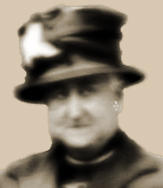The droghte of March
It has recently come to Lady Bracknell's attention that there exists a blog suitable for those readers who find her ladyship's own prose style to be somewhat too modern and avant garde for their linguistic tastes: Geoffrey Chaucer has joined the blogosphere!
There has, perforce, been a considerable gap between the publication of the Canterbury Tales and Mr Chaucer's current work, but Lady Bracknell is pleased to note that the gentleman in question has lost none of his wit or sense of mischief during the intervening centuries. Indeed, she would go so far as to say that Mr Chaucer demonstrates an admirably sprightly intellect for one of his advanced years.
Lady Bracknell's own familiarity with Mr Chaucer's earlier works is, she is ashamed to admit, limited to the prologue to the Canterbury Tales and the Pardoner's Tale, both of which formed part of her A level English literature syllabus.
At Lady Bracknell's alma mater, the A level English course was in the hands of two very different teachers. Miss M, a spinster of desiccated appearance, woollen cardigans and uncertain age, was exceedingly uncomfortable with any literary references to bodily functions or worldly lusts. Whilst her preferred texts therefore consisted of anything written by either Jane Austen or John Donne, she could, if the need arose, extend her scope to the works of Mr Shakespeare, as long as she had the option to gloss over anything unseemly or unhygienic.
(Miss M chiefly concerned herself with the school library. Lady Bracknell remembers as though it were yesterday the occasion on which Miss M explained the correct way to turn the pages of a library book. This feat can indeed be accomplished without any danger of soiling the page one wishes to turn. But not, in Lady Bracknell's opinion, without a concomitant reduction in the pleasure one might otherwise derive from actually reading the book.)
Mr G, on the other hand, revelled in the seamier side of the literary classics to a rather disturbing degree. When introducing the character of Edmund in King Lear, for instance, he was noticeably disappointed to be cheated of his opportunity to explain in enthusiastic detail what a bastard is when the entire Lower Sixth English class admitted that they were already well-acquainted with the dictionary definition.
As Miss M would very likely have succumbed to a fit of the vapours had she been called upon to provide an exegesis of the more vulgar aspects of Mr Chaucer's work, it fell to Mr G to cover that part of the syllabus. Unfortunately, Mr G combined a high degree of confidence in his ability to pronounce Chaucer's English correctly with a rather ill-fitting set of dentures. With the result that, as the young Lady Bracknell, being something of a "swot", sat in the front row of his lessons, her memories of studying Chaucer are forever marred with the recollection of being covered in a fine spray of saliva.
Her own experiences of Chaucer aversion therapy during her formative years notwithstanding, Lady Bracknell is pleased to recommend the literary giant's blog to her readers.
There has, perforce, been a considerable gap between the publication of the Canterbury Tales and Mr Chaucer's current work, but Lady Bracknell is pleased to note that the gentleman in question has lost none of his wit or sense of mischief during the intervening centuries. Indeed, she would go so far as to say that Mr Chaucer demonstrates an admirably sprightly intellect for one of his advanced years.
Lady Bracknell's own familiarity with Mr Chaucer's earlier works is, she is ashamed to admit, limited to the prologue to the Canterbury Tales and the Pardoner's Tale, both of which formed part of her A level English literature syllabus.
At Lady Bracknell's alma mater, the A level English course was in the hands of two very different teachers. Miss M, a spinster of desiccated appearance, woollen cardigans and uncertain age, was exceedingly uncomfortable with any literary references to bodily functions or worldly lusts. Whilst her preferred texts therefore consisted of anything written by either Jane Austen or John Donne, she could, if the need arose, extend her scope to the works of Mr Shakespeare, as long as she had the option to gloss over anything unseemly or unhygienic.
(Miss M chiefly concerned herself with the school library. Lady Bracknell remembers as though it were yesterday the occasion on which Miss M explained the correct way to turn the pages of a library book. This feat can indeed be accomplished without any danger of soiling the page one wishes to turn. But not, in Lady Bracknell's opinion, without a concomitant reduction in the pleasure one might otherwise derive from actually reading the book.)
Mr G, on the other hand, revelled in the seamier side of the literary classics to a rather disturbing degree. When introducing the character of Edmund in King Lear, for instance, he was noticeably disappointed to be cheated of his opportunity to explain in enthusiastic detail what a bastard is when the entire Lower Sixth English class admitted that they were already well-acquainted with the dictionary definition.
As Miss M would very likely have succumbed to a fit of the vapours had she been called upon to provide an exegesis of the more vulgar aspects of Mr Chaucer's work, it fell to Mr G to cover that part of the syllabus. Unfortunately, Mr G combined a high degree of confidence in his ability to pronounce Chaucer's English correctly with a rather ill-fitting set of dentures. With the result that, as the young Lady Bracknell, being something of a "swot", sat in the front row of his lessons, her memories of studying Chaucer are forever marred with the recollection of being covered in a fine spray of saliva.
Her own experiences of Chaucer aversion therapy during her formative years notwithstanding, Lady Bracknell is pleased to recommend the literary giant's blog to her readers.










